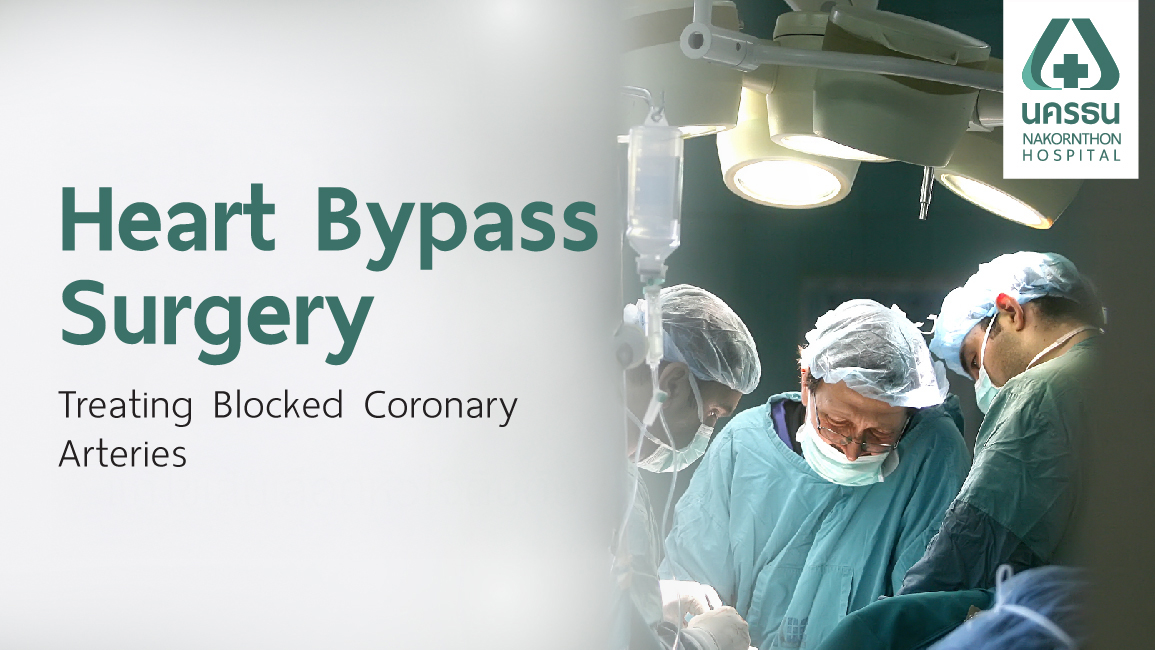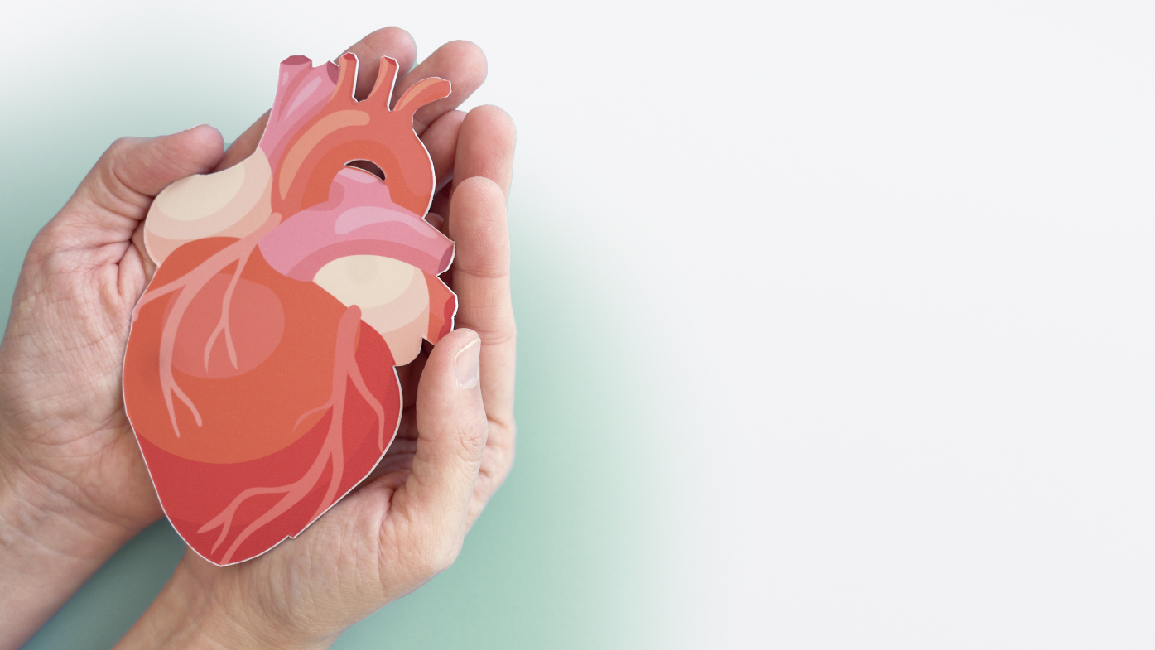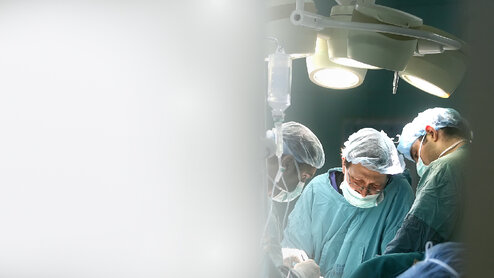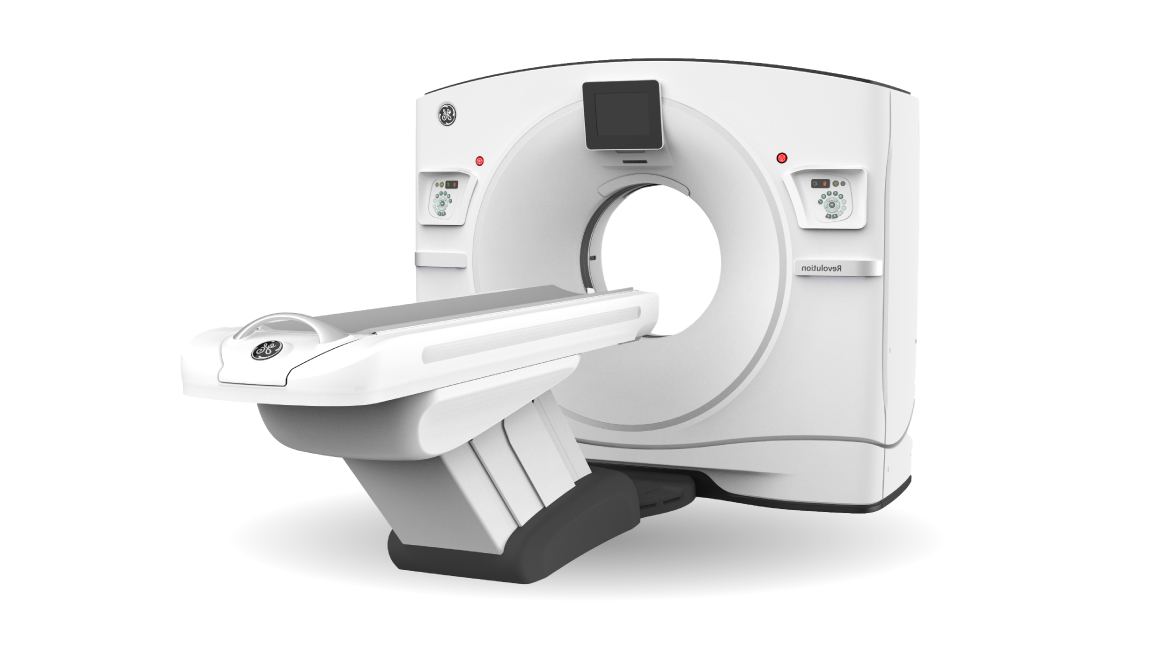Bypass Surgery: Targeted Treatment for Coronary Artery Disease
Center : Heart Center, Orthopedics Center
Article by : Dr. Patcharee Pawasuttikul

Bypass surgery, or coronary artery bypass graft surgery (CABG), treats patients with coronary artery blockages greater than 70% or those who have suffered a heart attack. It's also indicated for cases with multiple blocked arteries or blockages in specific locations where balloon angioplasty and stent placement might damage the blood vessels. This treatment option effectively reduces mortality rates from acute heart failure.
Table of Contents
- What is Coronary Artery Bypass Graft Surgery?
- Indications for Coronary Artery Bypass Surgery
- What conditions are treated by Coronary Artery Bypass Surgery?
- Preoperative diagnosis before Coronary Artery Bypass Surgery
- Variations of Coronary Artery Bypass Graft Surgery
- How should patients take care of themselves after Coronary Artery Bypass Surgery?
- What are the advantages of Coronary Artery Bypass Surgery
- The risks or complications of Coronary Artery Bypass Surgery
- Get Coronary Artery Bypass Surgery (CABG) at Nakornthon Hospital
- Free Online Consultation with a Specialist
What is Coronary Artery Bypass Graft Surgery?


Heart bypass surgery, or coronary artery bypass grafting (CABG), is a surgical procedure that creates alternative pathways around blocked areas of coronary arteries to improve blood circulation. The blood vessels used for this procedure include arteries from the chest area, arteries from the wrist, and veins from the legs. The choice of blood vessel depends on the quality of vessels available and which location provides the better option.
Indications for Coronary Artery Bypass Surgery
The decision to perform heart bypass surgery requires evaluation by a cardiac specialist who considers the severity of coronary artery blockage, patient symptoms, overall health, and other risk factors, including:
- Severe coronary artery disease
- Myocardial ischemia or myocardial infarction (heart attack)
- Severe chest pain that doesn't respond to medication
- Multiple blocked arteries or blockages in locations where balloon angioplasty and stent placement might damage blood vessels
- Complications following coronary stent placement that cannot be corrected
- Ongoing myocardial ischemia after balloon angioplasty and coronary stent placement
- Life-threatening cardiac arrhythmias related to myocardial ischemia
- Presence of other heart conditions, such as heart valve regurgitation, ventricular septal rupture, etc.
What conditions are treated by Coronary Artery Bypass Surgery?
Coronary artery bypass surgery primarily treats conditions related to abnormal blood circulation to the heart, especially the following diseases:
- Severe or multi-vessel coronary artery disease
- Chronic myocardial ischemia, a condition where heart muscle continuously receives insufficient blood supply
- Acute myocardial infarction (heart attack)
- Congenital coronary artery abnormalities
- Life-threatening cardiac arrhythmias related to myocardial ischemia
- Heart failure resulting from myocardial ischemia
- Thrombosis (blood clot formation)
- Arteriosclerosis (hardening of arteries)
Preoperative diagnosis before Coronary Artery Bypass Surgery
Before undergoing coronary artery bypass surgery, patients must receive thorough diagnostic evaluations to assess their overall physical condition, the severity of coronary artery disease, and readiness for surgery. The main diagnostic procedures for the CABG surgery include:
- Medical history taking, such as inquiring about chest pain symptoms (frequency, severity, duration, and triggers), related symptoms like difficulty breathing, fatigue, palpitations, underlying medical conditions, history of cardiac treatment, current medications, drug allergies, smoking history, alcohol consumption, and family history of heart disease
- Physical examination and laboratory tests
- Cardiac assessment, including electrocardiogram, echocardiogram, exercise stress test, cardiac catheterization and coronary angiography
- Other examinations, such as chest X-ray and blood tests for reserve blood preparation

Variations of Coronary Artery Bypass Graft Surgery


There are several methods of coronary artery bypass surgery. The cardiac surgeon will diagnose and decide which method should be used to achieve the best outcome:
- On-pump CABG (using a cardiopulmonary bypass machine): This is the traditional coronary artery bypass surgery method. The surgeon temporarily stops the patient's heart during surgery and uses a cardiopulmonary bypass machine to function in place of the lungs for oxygen and carbon dioxide exchange, and to pump blood to various parts of the body without passing through the heart. This allows the surgeon to operate with precision since the heart is still and not moving. It is suitable for patients with multiple coronary artery blockages or complex blockage locations.
- Off-pump CABG (without cardiopulmonary bypass machine): In this method, the surgeon does not stop the patient's heart during surgery and does not use special equipment for blood pumping. The surgery is performed while the heart is still beating by using a Local Stabilizer to immobilize the area of the heart where the blood vessel connection is being made, while other parts of the heart continue to beat normally. This approach helps avoid complications that may arise from using the cardiopulmonary bypass machine, such as systemic inflammation, surgical wound infection, reduced mortality after surgery for patients with chronic kidney failure, and shorter hospital recovery time.
- Recovery time: Patients need to recover in the hospital for approximately 1 week for follow-up treatment, after which doctors will allow them to continue recovery at home
- Patients should follow their doctor's instructions, take medications as prescribed, and strictly follow up with their physician
- When the surgical wound is completely healed, approximately 10 days after surgery, patients can take showers
- Control risk factors such as diabetes and high blood pressure
- Quit smoking and avoid alcoholic beverages
- Change lifestyle habits, such as eating nutritious food, exercising regularly, and managing stress
- Avoid foods that increase blood cholesterol and blood sugar; when cooking, use vegetable oils instead of butter or animal fats, and choose boiling, steaming, and baking methods instead of frying
- Patients can return to light normal activities within 2 months after the bypass surgery and can resume sports within 4-6 months, depending on each individual's physical strength
- If any of these post-operative symptoms occur—high fever, chills, swollen and red wound, abnormal pain or discharge, difficulty breathing, severe chest pain, palpitations, dizziness or fainting, severe leg swelling, or severe leg pain—seek medical attention immediately
- Improved blood circulation to the heart muscle—bypass surgery helps direct blood to blocked vessels, ensuring the heart muscle receives sufficient oxygen and nutrients, reducing chest pain symptoms
- Reduced risk of heart attack—surgery can decrease the chance of acute myocardial ischemia
- Increased ability to perform activities and improved quality of life—after recovery, patients can engage in more activities such as walking, exercising, and working, with less fatigue
- For some patients, especially those with severe coronary artery disease, bypass surgery may reduce the risk of death from heart disease
- Some patients may be able to reduce their use of anti-angina medications or blood pressure medications after surgery (though some medications, such as antiplatelet drugs, will still be required lifelong)
- Infection at the surgical site
- Bleeding
- Kidney failure
- Stroke
- Cardiac arrhythmia
- Heart failure or acute myocardial infarction
- - Website : https://en.nakornthon.com
- - Facebook : Nakornthon Hospital - International Patient
- - Line : @nakornthoninter
- - Tel: 02-450-9999 (Available 24 hours)
How should patients take care of themselves after Coronary Artery Bypass Surgery?
After undergoing coronary artery bypass surgery, patients should follow these guidelines:
What are the advantages of Coronary Artery Bypass Surgery


Coronary artery bypass surgery offers several benefits, especially for patients with severe coronary artery disease. The main advantages include:
The risks or complications of Coronary Artery Bypass Surgery
Coronary artery bypass surgery carries risks because it is major surgery, and complications may occur. However, the chance of complications is low, and most can be addressed. Possible complications include:
Get Coronary Artery Bypass Surgery (CABG) at Nakornthon Hospital
The crucial factor in treating patients with coronary artery disease or blockage through coronary artery bypass surgery is choosing a hospital that meets international standards. Nakornthon Hospital's Heart Center is fully equipped with specialized cardiac physicians, cardiac surgeons, and a nursing team with extensive cardiac experience.
Nakornthon Hospital is particularly well-positioned to serve international patients residing in Thailand who seek quick recovery treatments without extended hospital stays. The hospital's state-of-the-art medical equipment and comprehensive facilities ensure that foreign patients receive efficient, targeted care tailored to their needs. Our advanced surgical techniques and experienced medical team specialize in minimizing recovery time—a significant advantage for expatriates and international visitors.
Nakornthon's cardiac department consistently demonstrates excellence in performing procedures that allow patients to return to their normal activities sooner compared to traditional approaches. Additionally, our multilingual staff ensures clear communication throughout the treatment process, making Nakornthon Hospital the preferred choice for international patients seeking high-quality cardiac care with faster recovery times in Thailand.
For more information, please contact:
Free Online Consultation
Article of Heart Center, Orthopedics Center
High-Speed CT scan 443 Slices: Precision, Speed, and Reduced Radiation Exposure






